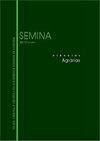Degree of technification of the sheep herd may be associated with seropositivity for the maedi-visna virus In South Brasil
IF 0.5
4区 农林科学
Q4 AGRICULTURE, MULTIDISCIPLINARY
引用次数: 0
Abstract
Maedi-Visna (MV) is a chronic progressive multisystem disease that may be asymptomatic for several months or years, but progress rapidly, and may result in death, when signs and symptoms evolve. Viral elimination occurs mainly through direct contact with positive animal secretions. There is no vaccine or treatment, and prophylaxis is necessary for the health of the herd. The present study aimed to verify the seropositivity of MV and evaluate the factors associated with the risk in sheep herds in Paraná. A total of 1549 serum samples were collected from 90 properties. An epidemiological questionnaire was applied to each property, and the variables were analyzed using the Epi-info program and R environment. Of the 1549 samples analyzed, 22 were positive (1.4%) for the micro-AGID test in 13.3% of the properties. Our study demonstrated variables associated with the prevention and the risk of seropositivity to MVV. Conducting a breeding season, supplying concentrated feed, and separating the breeding stock before birth were factors associated with protection, whereas the previous occurrence of problems with lice, breeding on pasture, and keeping cats close to the flock were factors associated with risk. The seropositivity observed in the present study suggests the circulation of MVV in sheep herds in Paraná, which reinforces the need to implement prevention and control measures since the level of technification may be associated with the occurrence of anti-MVV antibodies in herds.在巴西南部,羊群的技术程度可能与maedii -visna病毒血清阳性有关
Maedi Visna(MV)是一种慢性进行性多系统疾病,可能在数月或数年内无症状,但进展迅速,当体征和症状演变时可能导致死亡。病毒清除主要通过与阳性动物分泌物直接接触进行。没有疫苗或治疗方法,预防对牛群的健康是必要的。本研究旨在验证MV的血清阳性率,并评估与巴拉那羊群风险相关的因素。共从90处房产采集了1549份血清样本。将流行病学问卷应用于每个物业,并使用Epi-info程序和R环境对变量进行分析。在分析的1549个样本中,有22个样本的微AGID测试呈阳性(1.4%),其中13.3%的属性呈阳性。我们的研究证明了与MVV的预防和血清阳性风险相关的变量。进行繁殖季节、提供浓缩饲料和在出生前分离种畜是与保护相关的因素,而之前发生的虱子问题、在牧场上繁殖和让猫靠近羊群是与风险相关的因素。本研究中观察到的血清阳性表明,巴拉那的绵羊群中存在MVV循环,这加强了实施预防和控制措施的必要性,因为技术水平可能与绵羊群中抗MVV抗体的出现有关。
本文章由计算机程序翻译,如有差异,请以英文原文为准。
求助全文
约1分钟内获得全文
求助全文
来源期刊

Semina-ciencias Agrarias
农林科学-农业综合
CiteScore
1.10
自引率
0.00%
发文量
148
审稿时长
3-6 weeks
期刊介绍:
The Journal Semina Ciencias Agrarias (Semina: Cien. Agrar.) is a quarterly publication promoting Science and Technology and is associated with the State University of Londrina. It publishes original and review articles, as well as case reports and communications in the field of Agricultural Sciences, Animal Sciences, Food Sciences and Veterinary Medicine.
 求助内容:
求助内容: 应助结果提醒方式:
应助结果提醒方式:


